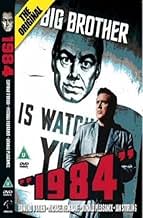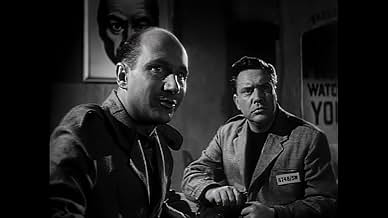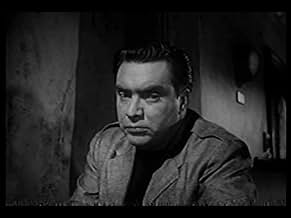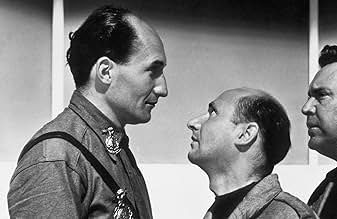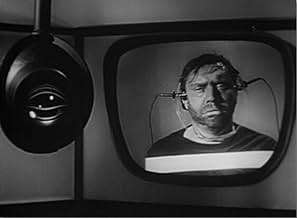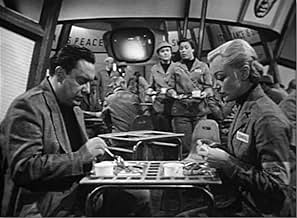IMDb RATING
6.9/10
4.7K
YOUR RATING
In a totalitarian future society, Winston Smith, whose daily work is re-writing history, tries to rebel by falling in love.In a totalitarian future society, Winston Smith, whose daily work is re-writing history, tries to rebel by falling in love.In a totalitarian future society, Winston Smith, whose daily work is re-writing history, tries to rebel by falling in love.
- Director
- Writers
- Stars
Donald Pleasence
- R. Parsons
- (as Donald Pleasance)
Kenneth Griffith
- Prisoner
- (as Kenneth Griffiths)
Barbara Cavan
- Woman
- (voice)
- (uncredited)
Walter Gotell
- Guard
- (uncredited)
Anthony Jacobs
- Telescreen
- (voice)
- (uncredited)
Barbara Keogh
- Special Woman
- (uncredited)
Bernard Rebel
- Kalador
- (uncredited)
- Director
- Writers
- All cast & crew
- Production, box office & more at IMDbPro
6.94.7K
1
2
3
4
5
6
7
8
9
10
Featured reviews
The Assumptions on which his society is built
9/11/01 is the date we lost a lot of freedom, perhaps irrevocably. Whether we move into the society that George Orwell describes in 1984 or retain a significant measure of individuality is up to us. But we will sacrifice a lot for security.
Which in Orwell's world written in the late Forties the target date was 1984. Like On The Beach Orwell got the date wrong, but doesn't mean it still can't happen. Atomic war came in 1965 and the world divided into three great super republics, people's republics if you will. Our American leads in a mostly British supporting cast, Edmond O'Brien and Jan Sterling, are from different factions. O'Brien is a member of the Inner Party with a drone like job who is starting to question assumptions on wish his society is built. Among them marriage is tightly controlled with love not a factor. But he does fall for Jan Sterling of the Outer Party.
In a country with constant monitoring, privacy is what they want. But there is no right to privacy and surveillance goes way beyond what we have post 9/11. Sterling and O'Brien pay big time for wanting some alone time.
Besides Sterling and O'Brien other performances to point out are Michael Redgrave as O'Brien's superior at work, Donald Pleasance as another drone worker who is also a graduate of the state's re-education facility and David Kossoff as the kindly old antique dealer who turns out to be something else.
The society most resembling the Orwellian 1984 is that of North Korea with their hermetically sealed country with a cult of secular worship of the ruling family. If the people there shake loose from the tyranny of the People's Republic it might be a great indication of hope for people who will insist on their individualism. Are we sliding in that direction? Time will tell.
1984 has had a few different versions made for big and small screen. This one can stand with any of them.
Which in Orwell's world written in the late Forties the target date was 1984. Like On The Beach Orwell got the date wrong, but doesn't mean it still can't happen. Atomic war came in 1965 and the world divided into three great super republics, people's republics if you will. Our American leads in a mostly British supporting cast, Edmond O'Brien and Jan Sterling, are from different factions. O'Brien is a member of the Inner Party with a drone like job who is starting to question assumptions on wish his society is built. Among them marriage is tightly controlled with love not a factor. But he does fall for Jan Sterling of the Outer Party.
In a country with constant monitoring, privacy is what they want. But there is no right to privacy and surveillance goes way beyond what we have post 9/11. Sterling and O'Brien pay big time for wanting some alone time.
Besides Sterling and O'Brien other performances to point out are Michael Redgrave as O'Brien's superior at work, Donald Pleasance as another drone worker who is also a graduate of the state's re-education facility and David Kossoff as the kindly old antique dealer who turns out to be something else.
The society most resembling the Orwellian 1984 is that of North Korea with their hermetically sealed country with a cult of secular worship of the ruling family. If the people there shake loose from the tyranny of the People's Republic it might be a great indication of hope for people who will insist on their individualism. Are we sliding in that direction? Time will tell.
1984 has had a few different versions made for big and small screen. This one can stand with any of them.
10bux
Double good version of the Orwell classic
Dingy, atmospheric version of George Orwells tale concerning two citizens of the New World Order involved in illicit, illegal love. Nothing is pretty in this story, and perhaps O'Brian and Sterling are a bit long in the tooth for the characters the author had in mind, however the superb dramatizations overcome any casting mishaps. The story of life in a totalitarian society rings chillingly familiar today. And, in the conclusion, to quote the poet laureate of our times, Todd Rundgren "Winston Smith Takes it on the Jaw Again!"
A Cold War 1984
It's been too long since I read the book, so I'm just concerned with the movie as a movie. And what a downer the 90-minutes is for the generally sunny 1950's. Hard to think of a grimmer storyline or more downbeat ending for that period. I take the film's anomalous presence as a useful Cold War commentary on the Soviet Union, the rivalry then at its peak.
Anyhow, the sets are grim, even the one outdoor scene is drained of any natural beauty, while the photography remains dull gray, as it should be given the dystopian subject matter. Then too, the two leads, O'Brien and Sterling, are not exactly marquee names. However, they are excellent actors, as the storyline requires—you don't want "movie stars" competing with the plot-heavy symbolism. In short, the production, though clearly economical, is pretty uncompromising.
Story-wise we're plunged into the middle of the dystopian society without much explanation of how it got that way or why. Instead, the narrative emphasizes the tools of thought control among Party members, who are subjected to all sorts of thought conditioning techniques, such as the histrionic hate sessions. Just how the non-party people live is not really portrayed. However, love may be forbidden among Party members, but I doubt that it was among the common people, otherwise how would re-population take place.
Besides dwelling on Winston's (O'Brien) efforts at contacting the political underground, the script dwells on the forbidden love affair between Winston and Julia (Sterling). And I had to laugh when Julia sheds her shapeless Party uniform for a flowing white gown right out of the Loretta Young Show of the time. This may be the movie's one concession to 1950's norms. The film does manage a few twists, one of which I didn't see coming. But, if I have one complaint, it's that Redgrave's high Party official lacks subtlety, in pretty much a one-note performance. This can be seen as a defect if you think about his official's changing roles.
Anyway, the film remains a visual oddity for then as well as now. However, its thought- control message, though crudely put, may be more relevant in our digitalized age than it was then. At the same time, this is one of the few subjects that I think needs a bigger budget remake to do it justice. I haven't seen the latest remake from 1984, so I can't comment on its worth. All in all, this version maintains a grimly narrow, but thought-provoking focus.
(In passing—having seen the movie on first release, I seem to remember the "rat cage" sequence as being longer, more detailed with glowing eyes, and much scarier than my DVD version. But then that was well over 50-years ago.)
Anyhow, the sets are grim, even the one outdoor scene is drained of any natural beauty, while the photography remains dull gray, as it should be given the dystopian subject matter. Then too, the two leads, O'Brien and Sterling, are not exactly marquee names. However, they are excellent actors, as the storyline requires—you don't want "movie stars" competing with the plot-heavy symbolism. In short, the production, though clearly economical, is pretty uncompromising.
Story-wise we're plunged into the middle of the dystopian society without much explanation of how it got that way or why. Instead, the narrative emphasizes the tools of thought control among Party members, who are subjected to all sorts of thought conditioning techniques, such as the histrionic hate sessions. Just how the non-party people live is not really portrayed. However, love may be forbidden among Party members, but I doubt that it was among the common people, otherwise how would re-population take place.
Besides dwelling on Winston's (O'Brien) efforts at contacting the political underground, the script dwells on the forbidden love affair between Winston and Julia (Sterling). And I had to laugh when Julia sheds her shapeless Party uniform for a flowing white gown right out of the Loretta Young Show of the time. This may be the movie's one concession to 1950's norms. The film does manage a few twists, one of which I didn't see coming. But, if I have one complaint, it's that Redgrave's high Party official lacks subtlety, in pretty much a one-note performance. This can be seen as a defect if you think about his official's changing roles.
Anyway, the film remains a visual oddity for then as well as now. However, its thought- control message, though crudely put, may be more relevant in our digitalized age than it was then. At the same time, this is one of the few subjects that I think needs a bigger budget remake to do it justice. I haven't seen the latest remake from 1984, so I can't comment on its worth. All in all, this version maintains a grimly narrow, but thought-provoking focus.
(In passing—having seen the movie on first release, I seem to remember the "rat cage" sequence as being longer, more detailed with glowing eyes, and much scarier than my DVD version. But then that was well over 50-years ago.)
Greetings (but certainly not "Love") from Dystopia!
Good, and I do really mean GOOD, dystopian Sci-Fi is the only (sub-) genre in cinema that occasionally manages to frighten me or make me feel uncomfortable. Titles such as "Soylent Green", "Z. P. G", or the more recent "Children of Men" are deeply disturbing not because we will be battling alien races or intelligent robots in the not-so-distant future, but because mankind itself made the planet unlivable. George Orwell, and his uniquely magnificent novel "1984", is probably the founding father of dystopian SciFi (although the influence of "Metropolis" is also unneglectable) and it's still one of the most horrifying tales ever written as far as I'm concerned.
Admittedly "1984" didn't turn out to be the phenomenal movie I secretly hoped it would be. It's an engaging, competently made, and absorbing transfer of Orwell's totalitarian nightmare from paper to screen, but some things are missing. I just didn't feel it. I didn't feel Big Brother's eyes penetrating in my back, I didn't feel the Inner Party's tyrannical madness, or their greed to own and control every human being's life. I didn't feel Winston and Julia's desperate desire to live in complete freedom. Perhaps the year of release, 1956, was still a bit too early to turn the novel into a motion picture. Director Michael Anderson somewhat fails to recreate the bleak and depressing atmosphere, as well as the dauntingly monotonous set-pieces, of a truly miserable dystopian world. 20 years later, however, Anderson would prove himself certainly capable of doing so with "Logan's Run". The 70s were just the ideal decade for dystopian Sci-Fi.
Of course, I would like to finish by underlining that "1984" is nevertheless a very good film, and worth tracking down for fans of the Sci-Fi genre, as well as George Orwell admirers. Several aspects are fantastic, notably the strong performances of the emotional Jan Sterling and the stoic Michael Redgrave. There are a handful effectively disturbing highlights as well, like the inspection rituals Winston has to endure in his own apartment, the public promoting of events like "hate-week" or the persona of young Selena Parsons, who has been so completely indoctrinated by Big Brother that she even becomes terrifying to her own neighbor and father (the stupendous Donald Pleasance in an early role).
Admittedly "1984" didn't turn out to be the phenomenal movie I secretly hoped it would be. It's an engaging, competently made, and absorbing transfer of Orwell's totalitarian nightmare from paper to screen, but some things are missing. I just didn't feel it. I didn't feel Big Brother's eyes penetrating in my back, I didn't feel the Inner Party's tyrannical madness, or their greed to own and control every human being's life. I didn't feel Winston and Julia's desperate desire to live in complete freedom. Perhaps the year of release, 1956, was still a bit too early to turn the novel into a motion picture. Director Michael Anderson somewhat fails to recreate the bleak and depressing atmosphere, as well as the dauntingly monotonous set-pieces, of a truly miserable dystopian world. 20 years later, however, Anderson would prove himself certainly capable of doing so with "Logan's Run". The 70s were just the ideal decade for dystopian Sci-Fi.
Of course, I would like to finish by underlining that "1984" is nevertheless a very good film, and worth tracking down for fans of the Sci-Fi genre, as well as George Orwell admirers. Several aspects are fantastic, notably the strong performances of the emotional Jan Sterling and the stoic Michael Redgrave. There are a handful effectively disturbing highlights as well, like the inspection rituals Winston has to endure in his own apartment, the public promoting of events like "hate-week" or the persona of young Selena Parsons, who has been so completely indoctrinated by Big Brother that she even becomes terrifying to her own neighbor and father (the stupendous Donald Pleasance in an early role).
Terrific, but the earlier Peter Cushing version.....
......is even better. One might be tempted to call this a remake, and I suppose it is, but it was the first theatrical rendition, enabling audiences to watch Big Brother (watching them) on a bigger screen than was possible via the BBC/Peter Cushing version (1954) of two years earlier. I agree with previous commentator "bux's" observance that, while Edmond O'Brien and Jan Sterling may not have been Orwell's first casting choices for Winston and Julia for the reason stated, the sterling performances generated by the leads and their supporting cast more than compensate. As a huge fan of the late, great Hammer Films luminary Michael Ripper, I was especially pleased to see him helping to take up the rear as an Outer Party Orator, exemplifying the tender loving care with which producer N. Peter Rathvon saw fit to cast even the smaller roles.
Did you know
- TriviaSonia Orwell, widow of George Orwell, objected to the changed ending, and had this movie withdrawn from circulation.
- Quotes
O'Connor of the Inner Party: You will be hollow. We will squeeze you empty and fill you with ourselves, with love of Big Brother.
- Alternate versionsThere are two endings to this film. The UK version ends with a defiant Winston Smith and Julia being executed by the authorities. The US version is more faithful to Orwell's book and concludes with Winston and Julia being brainwashed into becoming loyal followers of "Big Brother."
- ConnectionsEdited into Orwell: 2+2=5 (2025)
- SoundtracksSymphony No.5: Second Movement
(uncredited)
Music by Ludwig van Beethoven
Arranged by Malcolm Arnold
[Dining area muzak]
- How long is 1984?Powered by Alexa
Details
- Release date
- Country of origin
- Language
- Also known as
- Neunzehnhundertvierundachtzig
- Filming locations
- Production company
- See more company credits at IMDbPro
- Runtime
- 1h 30m(90 min)
- Color
Contribute to this page
Suggest an edit or add missing content

